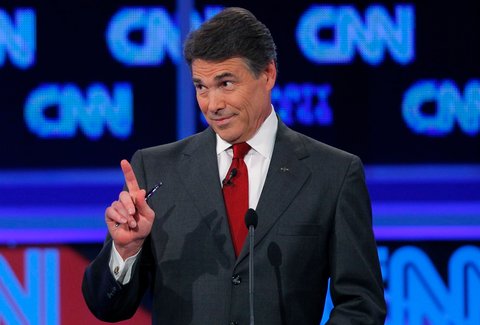Perry Has it Both Ways on Every Issue

Last night’s debate showed that, in 2012, Rick Perry may be what Phil Gramm was in 1996: an overrated, negative candidate with a lot of money who goes nowhere very fast.
It gives me no pleasure to say that. I am not committed to any one of the GOP presidential candidates. But no one could watch CNN’s excellent debate and conclude that Perry is ready for prime time.
As Fred Bauer and Corey Chambliss point out, that’s because Perry won’t engage. He won’t talk specifics. He won’t tell us what, exactly, he would do as president. He’s all blow-hard rhetoric and obfuscation signifying very little.
Moreover, like former Texas Senator Phil Gramm, Perry is kind of a downer. He has a negative message. He simply wants to “make Washington, D.C. as inconsequential in your life as I can.”
Gramm talked about forcing able-bodied Americans “to get out of the wagon and help the rest of us pull” the wagon. GOP primary voters were underwhelmed and unimpressed and thus forced Gramm to “get out of the race” altogether.
Perry’s problems were most notable on Social Security. Perry did say, finally and belatedly, that he won’t take Social Security away from those who now depend upon it. But what he would do to reform or restructure Social Security remains a mystery. As Mitt Romney observed,
the real question is: Does Governor Perry continue to believe that Social Security should not be a federal program, that it’s unconstitutional; and [that] it should be returned to the states -- or is he going to retreat from that view?
We don’t know. But what we do know is that Obama and his team will exploit Perry’s Social Security ambiguity and weakness big-time in pivotal states such as Florida, Pennsylvania and Arizona.
Unfortunately, Social Security isn’t the only issue where Perry tried to skate by on airy and platitudinous pronouncements. When it came to his controversial mandate for HPV vaccinations, Perry spoke literally out of both sides of his mouth.
He admitted a tactical error (“I made a mistake by not going to the [Texas] legislature”), but said that the policy was right:
At the end of the day, this was about trying to stop a cancer and giving the parental option to opt out of that. And, at the end of the day -- you may criticize me about the way that I went about it, but at the end of the day, I am always going to err on the side of life. And that's what this was really all about for me.
Michele Bachmann and Rick Santorum, though, would have none of Perry’s equivocation and doublespeak. They jumped all over the hapless Texan, and deservedly so.
Bachmann: “The question is: is it about life, or was it about millions of dollars, and potentially billions, for a drug company?” Perry’s former chief of staff, she explained, was the chief lobbyist for the drug company, Merck, that stood to make millions of dollars from his executive order mandating the HPV vaccination.
Ditto Santorum: “I think we need to hear what Governor Perry’s saying. He’s saying that his policy was right. He believes that what he did was right. He thinks he went about it the wrong way. I believe [his] policy is wrong… [It] is big government run amok.”
The government mandates vaccinations against communicable diseases, Santourm explained; but HPV is not a communicable disease. (It is spread through sexual contact.)
Worse yet, on Afghanistan Perry showed that there is no daylight between him, Jon Huntsmann and Obama: They would all work to effect a rapid American withdrawal from Afghanistan.
Well, I agree with Governor Huntsman when we talk about it's time to bring our young men and women home and as soon and obviously as safely as we can. But it's also really important for us to continue to have a presence there.
Again, the Perry doublespeak! As with most things, he’s for it, but he’s also against it. If, however, you cut through Perry’s rhetorical evasions, he’s saying that we should continue to help Afghanistan, but not with our military.
Of course, this is makes no sense and betrays a real ignorance of the world in general and Afghanistan in particular: Because without American boots on the ground, aid workers surely will be targeted and unwilling to venture forth in Afghanistan to dispense aid.
To be sure, Perry wants to “make a transition to where that country’s military is going to be taking care of their people,” but that will take many years to fully effect. What does Perry propose we do in the meantime?
The real unanswered question is: Why is Perry running? What motivates him? Where does his passion lie? What banner does he hold high? States rights?
If Perry thinks he’s gonna win the 2012 presidential election on a platform of states rights, then he’s even more clueless than his weak debate performance last night suggests.
John Guardiano blogs at strong>www.ResoluteCon.Com<, and you can follow him on Twitter: strong>@JohnRGuardiano<.

